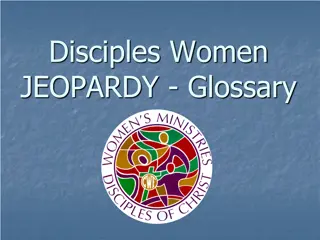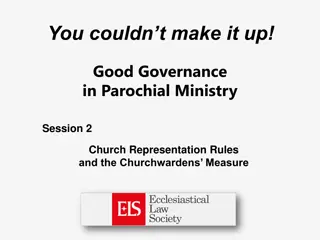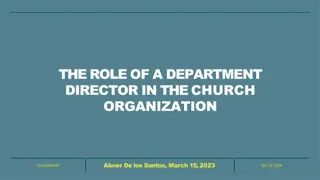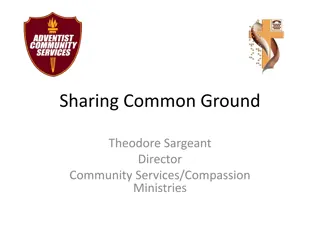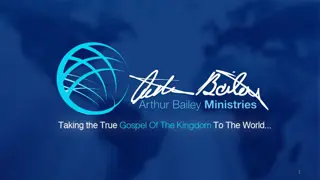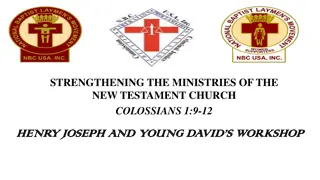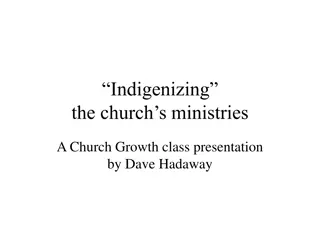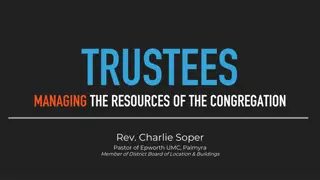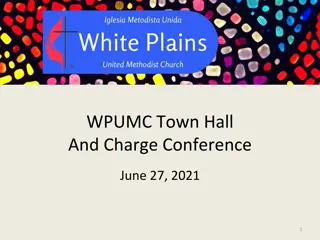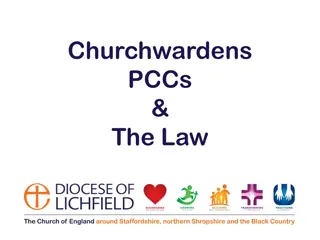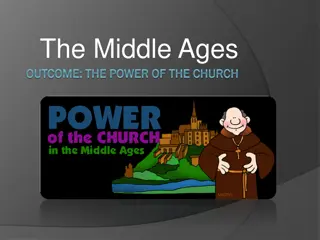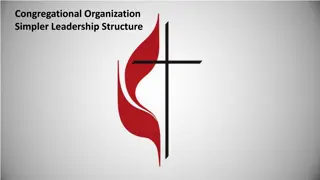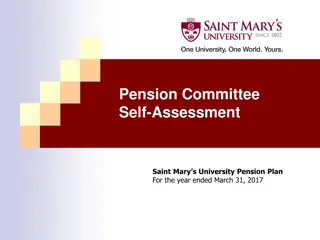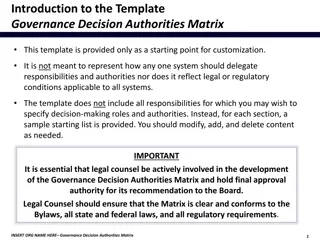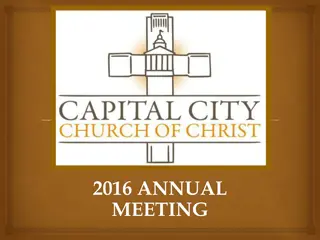Understanding Ordered Ministries: Roles and Responsibilities in Church Governance
Ordered ministries in the church, including presbyters, deacons, and elders, play vital roles in maintaining church life according to New Testament principles. This includes the election process and criteria for church nominating committees, as well as the defining characteristics and responsibilities of deacons. Through these ordered ministries, the ministry of the church is organized to support the flourishing of the entire congregation.
Download Presentation

Please find below an Image/Link to download the presentation.
The content on the website is provided AS IS for your information and personal use only. It may not be sold, licensed, or shared on other websites without obtaining consent from the author. Download presentation by click this link. If you encounter any issues during the download, it is possible that the publisher has removed the file from their server.
E N D
Presentation Transcript
WEEK TWO ORDERED MINISTRIES COUNCILS
Election by the People: F-3.0106 That though the character, qualifications, and authority of Church officers are laid down in the Holy Scriptures, as well as the proper method of their investiture and institution, yet the election of the persons to the exercise of this authority, in any particular society, is in that society.
What is Ordered Ministries? G-2.0102 Ordered Ministries include: Presbyters: Ruling Elders and Teaching Elders and Deacons G-2.0102 defines Ordered Ministries The Church s ordered ministries described in the New Testament and maintained by this church are deacons and presbyters (ministers of the Word and Sacrament and ruling elders). Ordered ministries are gifts to the church to order its life so that the ministry of the whole people of God may flourish. The existence of these ordered ministries in no way diminishes the importance of the commitment of all members to the total ministry of the church. The government of this church is representative, and the right of God s people to elect presbyters and deacons is inalienable. Therefore, no person can be placed in any ordered ministry in a congregation or council of the church except by election of that body. Ordination to the ministry of deacon, ruling elder, or minister of the Word and Sacrament (also called teaching elder) is unique to that order of ministry.
Church Nominating Committee: G-2.0401 Criteria for Church Nominating Committees: At least 3 people At least one active Elder Majority of the committee is elected by congregation and may not be active elders Pastor serves in an ex-officio capacity and without vote Nominations from the floor in the congregational meeting are always allowed Tuckahoe Presbyterian Church Nominating Committee: 5 members 1 Active Elder 1 Active Deacon 3 Persons elected by the Congregation Election ordinarily occurs in March each year at a congregational meeting
Deacons Defined: G-2.0201 The ministry of deacon as set forth in Scripture is one of compassion, witness, and service, sharing in the redeeming love of Jesus Christ for the poor, the hungry, the sick, the lost, the friendless, the oppressed, those burdened by unjust policies or structures, or anyone in distress . Persons of spiritual character, honest repute, exemplary lives, brotherly and sisterly love, sincere compassion, and sound judgment should be chosen for this ministry.
Ruling Elder Defined: G-2.0301 As there were in Old Testament times elders for the government of the people, so the New Testament church provided persons with particular gifts to share in discernment of God s Spirit and governance of God s people. Accordingly, congregations should elect persons of wisdom and maturity of faith, having demonstrated skills in leadership and being compassionate in spirit. Ruling elders are so named not because they lord it over the congregation (Matt. 20:25), but because they are chosen by the congregation to discern and measure its fidelity to the Word of God, and to strengthen and nurture its faith and life. Ruling elders, together with ministers of the Word and Sacrament, exercise leadership, government, spiritual discernment, and discipline and have responsibilities for the life of a congregation as well as the whole church, including ecumenical relationships. When elected by the congregation, they shall serve faithfully as members of the session. When elected as commissioners to higher councils, ruling elders participate and vote with the same authority as ministers of the Word and Sacrament, and they are eligible for any office.
Minister of Word and Sacrament Defined: G-2.0501 Ministers of the Word and Sacrament (also called teaching elders and pastors) shall in all things be committed to teaching the faith in word and deed and equipping the saints for the work of ministry (Eph. 4:12). They may serve in a variety of ministries, as authorized by the presbytery. When they serve as preachers and teachers of the Word, they shall preach and teach the faith of the church, so that the people are shaped by the pattern of the gospel and strengthened for witness and service. When they serve at font and table, they shall interpret and show forth the mysteries of grace in word and action, lifting the people s vision toward the hope of God s new creation. When they serve as pastors , they shall support the people in the disciplines of the faith amid the struggles of daily life. When they serve as presbyters, they shall participate in the responsibilities of governance, seeking always to discern the mind of Christ and to build up Christ s body through devotion, debate, and decision.
Categories of Ministers: G-2.0503 Pastoral Relationships: G-2.0504 Categories of Ministers: Validated Ministers Member at Large Ministers Retired Ministers Pastoral Relationships Installed Pastors: called by the congregation using a Pastor Nominating Committee Temporary Pastors: called by the Session; up to one year covenant which is renewable Ordinarily is not the next Installed Pastor Various titles used: Temporary; Stated Supply; Interim; Bridge Pastor
Calling a Pastor: G-2.08 1. A vacancy occurs with departure of the pastor. 2. With permission of Presbytery, congregation elects a PNC (Pastor Nominating Cte) 3. PNC reviews resumes, interviews, and settles on a candidate 4. Presbytery examines and approves the candidate 5. Session calls congregational meeting to hear report of the PNC 6. Congregation votes to extend a call 7. An ordination (if not ordained) and installation service is led by the presbytery.
Dissolution of Pastoral Relationships G-2.09 Presbytery alone establishes the pastoral relationship after congregation has issued the call to a new pastor. Presbytery alone dissolves the pastoral relationship Dissolution of a pastoral relationship may occur in one of three ways: Request by the Pastor that presbytery dissolve the pastoral relationship Request by the Congregation that presbytery dissolve the pastoral relationship Presbytery after inquiring into reported difficulties in a congregation may dissolve the pastoral relationship
Commissioned Ruling Elders G-2.10 Certified Christian Educators G-2.11 COMMISSIONED RULING ELDERS (CRE) Has to be a Ruling Elder Must obtain training required by the presbytery When approved by presbytery, CRE may serve a congregation and may be given authority to moderate Session, administer the sacraments, officiate at weddings when permitted by state law. Term is for 3 years and is renewable with annual review by the presbytery CERTIFIED CHRISTIAN EDUCATORS Have to have had training in six areas of knowledge Will meet minimum compensation & benefits as for ministers Privilege of the floor at presbytery meetings and may vote if also a Ruling Elder
Session Defined G-3.02 The session is the council for the congregation. It shall be composed of those persons elected by the congregation to active service as ruling elders, together with all installed pastors and associate pastors. All members of the session are entitled to vote. The pastor shall be the moderator of the session, and the session shall not meet without the pastor or designated moderator. If there is no installed pastor, or if the installed pastor is unable to invite another moderator, the presbytery shall make provisions for a moderator. Presbyteries shall provide by rule for moderators when the session is without a moderator for reasons of vacancy or inconvenience.
Session (continued) Meetings: At least quarterly; special meetings called by pastor or in writing by 2 elders Size of Session depends on each congregation Pastor is Moderator of Session Clerk of Session is elected by Session (does not have to be active elder) Minutes & Records Minutes are property of Session which decides what to share Membership rolls of Baptized, Active, and Affiliate Register rolls of baptisms, ruling elders and deacons, installed pastors
Presbytery Defined G-3.03 The presbytery is the council serving as a corporate expression of the church within a certain district and is composed of all the congregations and ministers of the Word and Sacrament within that district. The presbytery shall adopt and communicate to the sessions a plan for determining how many ruling elders each session should elect as commissioners to presbytery, with a goal of numerical parity of ministers of the Word and Sacrament and ruling elders. This plan shall require each session to elect at least one commissioner and shall take into consideration the size of congregations as well as a method to fulfill the principles of participation and representation found in F-1.0403 and G-3.0103. Ruling elders elected as officers of the presbytery shall be enrolled as members during the period of their service. A presbytery may enroll, or may provide by its own rule for the enrollment of, ruling elders during terms of elected service to the presbytery or its congregations
Synod Defined G-3.04 The synod is the intermediate council serving as a corporate expression of the church throughout its region. It shall consist of not fewer than three presbyteries within a specific geographic region.
General Assembly Defined G-3.05 The General Assembly is the council of the whole church and it is representative of the unity of the synods, presbyteries, sessions, and congregations of the Presbyterian Church (U.S.A.). It shall consist of equal numbers of ruling elders and ministers of the Word and Sacrament elected by the presbyteries and reflective of the diversity within their bounds (F-1.0403 and G-3.0103), to serve as commissioner


